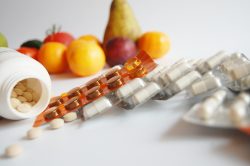Ways to Ease Vicodin Withdrawal during Vicodin Detox
The active ingredient of Vicodin, hydrocodone, is a semi-synthetic opioid derived from codeine and a Schedule III controlled substance “with a moderate to low potential for physical and psychological dependence,” according to the Drug Enforcement Administration. Acetaminophen has been added to enhance the pain relieving effects and to relieve fever. Physical dependence causes Vicodin withdrawal symptoms upon ceasing its use. These symptoms can become complex, more intense, or last longer, depending on other factors such as abuse, amounts used, length of use, and the person’s overall health.
Call Detox.com now to find Vicodin detox centers near you!
Vicodin Withdrawal Symptoms
Some of the most common withdrawal symptoms are intense drug cravings, agitation, fatigue, nausea, headache, vomiting, diarrhea, chills, dilated pupils, runny nose, and teary eyes. Some people may have serious symptoms of insomnia, anxiety, panic attacks, and other physical and psychological effects that are very painful and overwhelming.
Ways to Ease Vicodin Withdrawal during Vicodin Detox
There is never a guarantee when it comes to opioid withdrawals and Vicodin is no exception. Getting the drug out of the system is a critical step and the following are possible ways to ease Vicodin withdrawals during Vicodin detox:
Step Down Program

Staying well nourished can truly help you cope with withdrawal.
A person should not attempt to suddenly stop taking Vicodin if they have been using it for a long time or in high dosages. They should first, discuss with their doctor the safest way to quit. Decreasing the dosages gradually may be enough for the body to readjust to normal functioning with lesser medication until the person is able to quit completely.
Stop Taking Vicodin
When withdrawal symptoms are mild, ceasing the use of Vicodin may be recommended by the doctor as long as the process is considered safe. People who have used the medication as prescribed and for short duration may be good candidates for doing this.
Keep Hydrated and Get Nourishment
Loss of appetite, vomiting, diarrhea, and fever are side effects of Vicodin withdrawal and can lead to dehydration which will only make things worse. It is important to get plenty of fluids to stay hydrated as well as help the body flush out the drug and toxins. Vitamins and nutrients are also important to help the person get stronger. The B vitamins are great stress reducers and vitamins A and C are antioxidants which will help the person detox faster.
Stay Busy
Craving intensities are stronger if the mind has time to focus on them. Staying busy and redirecting your thoughts can help lessen the impact of the cravings.
Find Support
Spending time with and seeking help from family and others who have your best interest at heart can be encouraging and help to add distractions that will be replace negative emotions with positive ones. Avoid temptations and reminders that may “trigger” the urge to use. When unsure, seek help from professionals.
For more advice on Vicodin withdrawal, or for help finding a treatment center, call 800-996-6135(Who Answers?) .
Sources
- United States Drug Enforcement Administration. (n.d.). Drug Scheduling.
- U.S. National Library of Medicine. (2016). Opiate and Opioid Withdrawal.

